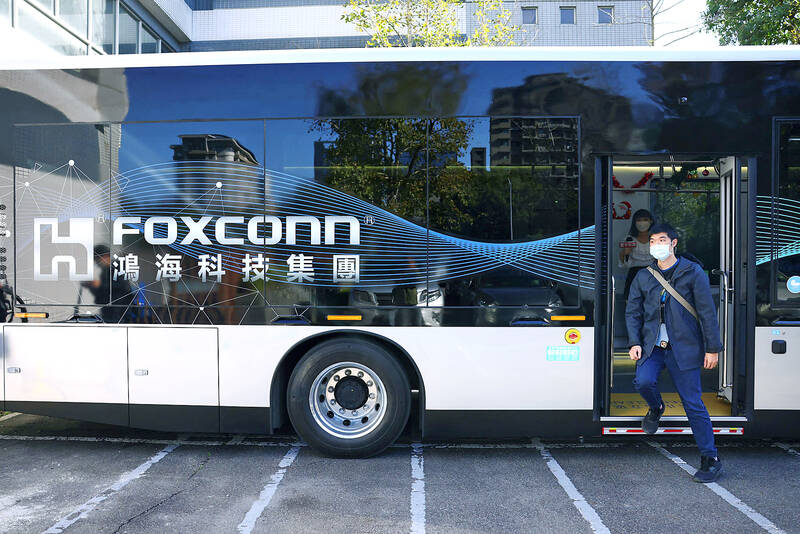Hon Hai Precision Industry Co’s (鴻海精密) revenue last year expanded 10.47 percent annually to a record high of NT$6.62 trillion (US$215.6 billion), the iPhone assembler said yesterday.
The result surpassed the expectations of the company and most market analysts.
The company, also known as Foxconn Technology Group (富士康科技集團) outside Taiwan, attributed the stronger-than-expected growth to robust demand for new consumer smart mobile devices, primarily Apple Inc’s iPhone 14 series, driven by the resumption of normal production at Hon Hai’s plant in Zhengzhou, China, in the fourth quarter of last year.

Photo: Annabelle Chih, REUTERS
Production at the manufacturing facility was disrupted in October when a COVID-19 outbreak caused worker departures and weeks-long unrest.
“The production and operation of the Zhengzhou campus returned to normal in December,” the company said in a statement. “The outlook for the first quarter of 2023 is expected to be roughly in line with market consensus.”
Hon Hai did not provide details about the market consensus, but the January-to-March quarter is usually a slow season for most electronics companies.
The company’s revenue in the first quarter of last year plummeted 26 percent to NT$1.407 trillion from the previous quarter, company data showed.
Hon Hai’s sales surged 14.2 percent to NT$629.3 billion last month from NT$551.09 billion in November last year, with three major product lines registering sequential growth except for computing products, company data showed.
That brought last quarter’s total revenue to NT$1.957 trillion, up 12.06 percent quarter-on-quarter and 3.54 percent year-on-year, the company said.
Hon Hai last month estimated that revenue for last quarter would be little changed from NT$1.89 trillion a year earlier.
By product segment, revenue from smart consumer electronics products last quarter was flat from a year earlier after production at the Zhengzhou campus returned to normal, the statement said.
On an annual basis, revenue from cloud and networking products posted double-digit percentage growth last quarter, benefiting from robust server demand, the company said.
Computing products also posted significant year-on-year growth, thanks to better component supply.
Revenue from components and other products dropped slightly last quarter from a year earlier due to a reduction in non-core businesses, the statement said.

CHIP RACE: Three years of overbroad export controls drove foreign competitors to pursue their own AI chips, and ‘cost US taxpayers billions of dollars,’ Nvidia said China has figured out the US strategy for allowing it to buy Nvidia Corp’s H200s and is rejecting the artificial intelligence (AI) chip in favor of domestically developed semiconductors, White House AI adviser David Sacks said, citing news reports. US President Donald Trump on Monday said that he would allow shipments of Nvidia’s H200 chips to China, part of an administration effort backed by Sacks to challenge Chinese tech champions such as Huawei Technologies Co (華為) by bringing US competition to their home market. On Friday, Sacks signaled that he was uncertain about whether that approach would work. “They’re rejecting our chips,” Sacks

NATIONAL SECURITY: Intel’s testing of ACM tools despite US government control ‘highlights egregious gaps in US technology protection policies,’ a former official said Chipmaker Intel Corp has tested chipmaking tools this year from a toolmaker with deep roots in China and two overseas units that were targeted by US sanctions, according to two sources with direct knowledge of the matter. Intel, which fended off calls for its CEO’s resignation from US President Donald Trump in August over his alleged ties to China, got the tools from ACM Research Inc, a Fremont, California-based producer of chipmaking equipment. Two of ACM’s units, based in Shanghai and South Korea, were among a number of firms barred last year from receiving US technology over claims they have

It is challenging to build infrastructure in much of Europe. Constrained budgets and polarized politics tend to undermine long-term projects, forcing officials to react to emergencies rather than plan for the future. Not in Austria. Today, the country is to officially open its Koralmbahn tunnel, the 5.9 billion euro (US$6.9 billion) centerpiece of a groundbreaking new railway that will eventually run from Poland’s Baltic coast to the Adriatic Sea, transforming travel within Austria and positioning the Alpine nation at the forefront of logistics in Europe. “It is Austria’s biggest socio-economic experiment in over a century,” said Eric Kirschner, an economist at Graz-based Joanneum

France is developing domestic production of electric vehicle (EV) batteries with an eye on industrial independence, but Asian experts are proving key in launching operations. In the Verkor factory outside the northern city of Dunkirk, which was inaugurated on Thursday, foreign specialists, notably from South Korea and Malaysia, are training the local staff. Verkor is the third battery gigafactory to open in northern France in a region that has become known as “Battery Valley.” At the Automotive Energy Supply Corp (AESC) factory near the city of Douai, where production has been under way for several months, Chinese engineers and technicians supervise French recruits. “They